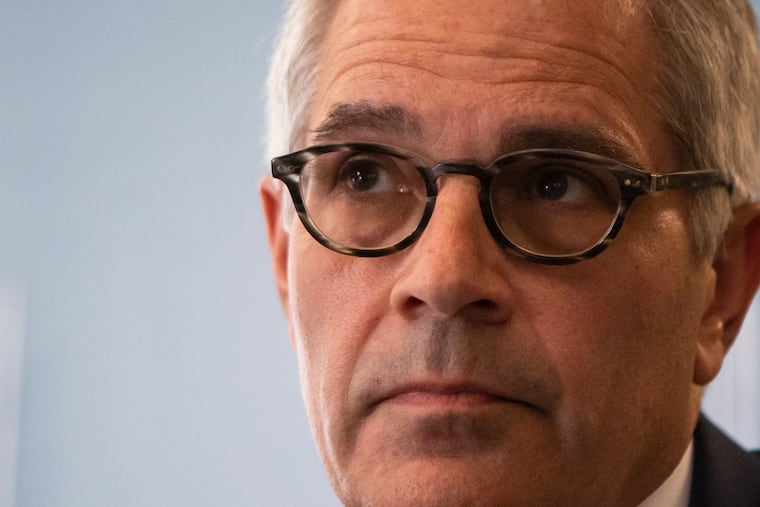DA Krasner wants to reduce charge in Rittenhouse stabbing case from murder to manslaughter
Krasner argued that a jury more likely will convict Michael White of voluntary manslaughter than third-degree murder in the death of Sean Schellenger.

On the eve of trial, District Attorney Larry Krasner filed a motion Friday to pursue a reduced charge against the man accused of fatally stabbing a real estate developer near Rittenhouse Square last year, saying his prosecutors would fare better with a jury arguing voluntary manslaughter rather than third-degree murder.
In the six-page motion filed with Common Pleas Court Judge Glenn B. Bronson, Krasner requested that his office be allowed to drop the higher charge because a jury could accept that Michael White stabbed Sean Schellenger “under a sudden or intense passion from serious provocation or acting in unreasonable self-defense” and still find him guilty of voluntary manslaughter.
Those elements, however, would be acceptable as a legal defense if White faced a charge of third-degree murder, according to the motion signed by Krasner.
“The district attorney’s strategic and policy-based decision is that the most likely way to secure a just conviction for this killing is to proceed to trial with a lead charge of voluntary manslaughter,” Krasner stated in the brief.
Linda Schellenger, the victim’s mother, blasted Krasner’s decision and urged the judge to reject the motion.
“Let the jury decide,” she said Friday night.
Krasner notified her family about his decision in a conference call about noon on Friday.
She pointed out that White was still charged with both third-degree murder and voluntary manslaughter; thus the jury could choose one or the other.
White was originally charged with first-degree murder, but that was withdrawn at his preliminary hearing. If convicted of third-degree murder, White would face 20 to 40 years in prison. Voluntary manslaughter would carry a penalty of 10 to 20 years.
“We are now a victim of Larry Krasner’s craziness of giving light sentences to murderers,” she said.
Jane Roh, a spokesperson for Krasner, declined to comment, citing a gag order in the case.
The trial is scheduled to start Monday.
In August, White’s lawyers told the judge that White would testify that Schellenger used a racial epithet during a physical altercation at 17th and Chancellor Streets on July 17, 2018.
It was the first time Schellenger, 37, had been accused in official proceedings or court documents of using a racial slur. White is black and Schellenger was white, and they did not know each other.
At that August hearing, prosecutors told the judge they did not have evidence that Schellenger used a racial epithet.
Linda Schellenger said Friday night that she, too, was told by prosecutors that there was no evidence that her son said anything racial.
In his motion, Krasner does not cite that allegation specifically, but mentions that the defense had recently provided information that could constitute a defense against third-degree murder.
Krasner stated that White will face new charges related to tampering with evidence and obstruction, and said there was an “agreement by the defense” to those charges if prosecutors file a request to not prosecute third-degree murder. Krasner did not elaborate on what else was being discussed with White’s lawyers.
In the motion, Krasner stated that “trust in the prosecution’s fairness is crucial to achieving individual justice for the victim, survivors, and all other Philadelphians in this matter.”
White, 22, was delivering food for Uber Eats on his bicycle when he encountered Schellenger, who was just gotten out of a Mercedes-Benz and was involved in a verbal dispute with the driver of another vehicle.
“At one point, Mr. White produced a large knife and pointed it down toward the pavement, while allegedly extending his other hand in a ‘stop’ gesture and moving slightly away from Mr. Schellenger,” according to the motion. “Mr. Schellenger moved toward Mr. White, charged him, and lifted Mr. White off the ground as if to tackle him, at which time Mr. White stabbed Mr. Schellenger deep in his back.”
As a policy of his office, Krasner said in the motion, he “rejects the notion of seeking the highest possible charge or the longest possible sentence as leverage or as a bargaining tactic in all cases.”
Malik Neal, director of the Philadelphia Bail Fund, one of two nonprofits that posted bail for White after he was arrested, applauded Krasner’s use of prosecutorial discretion.
“It is critically important, especially in difficult, highly publicized cases such as this one, that the district attorney base his charges on the facts before him — nothing more, nothing less. It is not only the right thing to do — justice requires it,” Neal said in a statement.